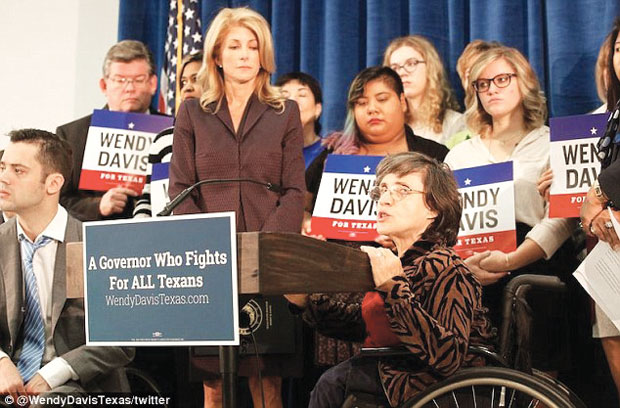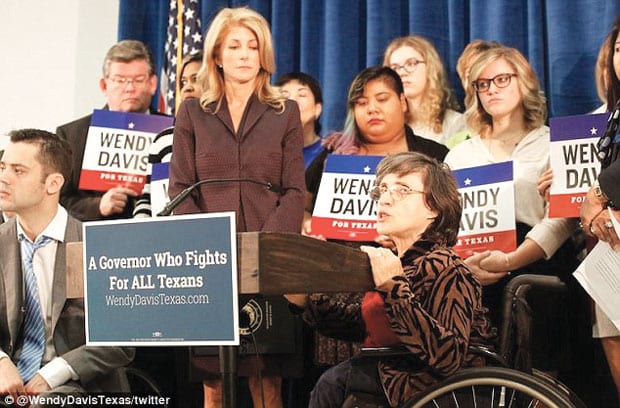Davis’ ‘wheelchair ad’ invigorates disabled LGBTs and allied Democrats

SPEAKING OUT | Sen. Wendy Davis listens to a supporter of her campaign during a recent press conference on the ‘wheelchair ad.’ (Courtesy of Wendy Davis campaign)
James Russell | Staff Writer
russell@dallasvoice.com
“A tree fell on Greg Abbott. He sued and got millions,” intones a narrator in an ominous voice, speaking over an image of an empty wheelchair.
Those first five seconds of a 32-second television advertisement released last weekend by Sen. Wendy Davis’ gubernatorial campaign once again put her in the national spotlight.
The ad, which airs in select markets, describes her Republican opponent for governor as a hypocrite, noting for instance that he argued against a rape victim and against people with disabilities.
Abbott’s accident in 1984 permanently paralyzed him and he has used a wheelchair since.
Ben Dreyfuss, a staff writer for Mother Jones magazine, called Davis’ now-infamous wheelchair ad “offensive and nasty” and said it “shouldn’t exist. She’s basically calling Abbott a cripple.”
Aaron Blake, a national political correspondent for the Washington Post, called the ad “the sort of highly risky gambit you only see from a long-shot campaign. And, as often as not, these sorts of ‘Hail Marys’ fail miserably.”
And an Abbott campaign spokeswoman said, “It is challenging to find language strong enough to condemn Sen. Davis’ disgusting television ad, which represents a historic low for someone seeking to represent Texans.”
But the Davis campaign chose to face down opponents and dig in its heels in defense of the ad. At a press conference on Monday, Oct. 13, at her Fort Worth field office, Davis reiterated the ad’s point: Abbott doesn’t fight for all Texans.
Davis was flanked at the press conference by disabled supporters and victims’ rights advocates, among them Lamar White, a straight SMU law student with cerebral palsy.
Though both conservative and liberal critics skewered the ad, none of a number of disabled LGBT and allied Texas Democrats interviewed for this article were offended. In fact, they praised Davis’ ad as factual and for pointing out what they said was hypocrisy.
“The ad was spot on. Being rich and disabled, like Abbott, is like being straight and white at a country club. He has done everything within his power to disenfranchise and distance himself from people with disabilities. [People with disabilities] disown him,” said Vicki Lynn Jurney-Taylor of San Antonio, who is bisexual and has spinal muscular atrophy.
Michael Cole, whose right leg was amputated below the knee, agreed. The LGBT ally is a Democrat running for an open seat in the conservative Congressional District 36.
“As a disabled person, I don’t see a problem with it,” Cole said. “It is a valid point raised by the Davis people. His wealth stems from the accident. He then used that wealth to take away the ability for others to seek legal redress. To me, Abbott made that hypocrisy an issue.”
Abbott’s response is to deflect, he added. By veering the message away from the facts, Cole indicated Abbott might be winning.
“We are too busy talking about the wheelchair and not the message of hypocrisy,” Cole said. “They can’t attack the message … so they are fighting it this way hoping to deflect [it].”
But Republicans condemning the ad are just as guilty of hypocrisy, Jurney-Taylor said. “[They] say it’s offensive to people with disabilities; yet they cut funding for the support programs that we need.”
It’s personal to Mary Ann Thompson-Frenk of Dallas, too. An LGBT ally who suffers from hearing loss, she said her personal challenges with her disability have only increased her “empathy for others facing their own challenges. I would expect any decent person to feel likewise. Which is what bothers me about Greg Abbott’s record demonstrating the opposite.
“The issue is not his disability but his hypocrisy,” Thompson-Frenk said. “I admire his drive to not allow his own disability from holding him back, but wonder why he would hurt other’s chances to recover and get their lives back on track as well.”
Early voting begins Monday, Oct. 20, and Election Day is Tuesday, Nov. 4.
This article appeared in the Dallas Voice print edition October 17, 2014.

